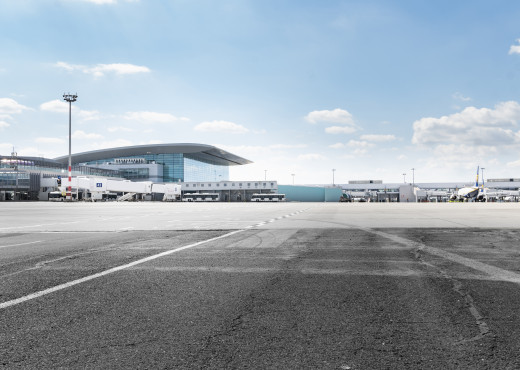 The airport operator and KPMG Consulting prepared a summary study in 2023, which details and quantifies the impacts of the airport’s operation in Hungary. It examines the economic, social and environmental impacts of Ferenc Liszt International Airport, and is complemented by a complex analysis of the impacts of the future developments planned by Budapest Airport. The study also examines the company’s contribution to the government’s strategic objectives and analyses Budapest Airport’s position, compared to its international competitors.
The airport operator and KPMG Consulting prepared a summary study in 2023, which details and quantifies the impacts of the airport’s operation in Hungary. It examines the economic, social and environmental impacts of Ferenc Liszt International Airport, and is complemented by a complex analysis of the impacts of the future developments planned by Budapest Airport. The study also examines the company’s contribution to the government’s strategic objectives and analyses Budapest Airport’s position, compared to its international competitors.
The key finding of the study is that the significance of Budapest Airport in the national economy goes far beyond its own economic performance. The total macroeconomic impact of the airport is estimated at 1780 billion HUF in 2022, which represents 2.7% of the national economy’s GDP in that year. The company itself contributed more than 110 billion HUF to the Hungarian economy, while through its suppliers and the 88 companies linked to it, it contributed four times as much to Hungary’s GDP, with a total of 457 billion HUF. In terms of induced effects, a foreign air passenger arriving in Budapest spent 208,000 HUF, while total expenditure by foreign visitors arriving at the airport last year contributed approximately 714 billion HUF to the Hungarian economy, which was 1.1% of GDP that year. In terms of specific impacts, each 100,000 passengers at the airport contribute around 13 billion HUF in value added, while creating 1081 jobs and generating 5 billion HUF in tax revenue for the economy.
The direct, indirect and induced economic impacts generated by Budapest Airport’s activities resulted in a contribution of nearly 600 billion HUF to the state budget in 2022, mainly in the form of wage-related taxes and contributions and VAT. In addition, the company contributes around 4.5 billion HUF a year to the revenues of neighboring municipalities and to community investments, through business and local taxes.
In terms of employment, Budapest Airport provides work for nearly 1500 people, with around 70% of the workforce living in the surrounding settlements. However, if we look at the entire value chain and the 88 companies closely linked to the operator, the airport provided jobs for approximately 132,000 people in 2022. Budapest Airport’s employees rated the company 8.4 out of 10 in the latest satisfaction survey, and according to Randstad’s 2021 survey, Budapest Airport was the most attractive employer in the Hungarian service sector. In 2022, BUD won the Investors in People international award for the second time, which recognizes companies committed to supporting the professional development of their employees.
In addition to economic development and employment, Budapest Airport’s activities contribute to the achievement of government objectives in a number of other areas. These include the government’s tourism strategy until 2030, the Digital Prosperity Program, the innovation strategy for 2021-2030, the National Transport Strategy and the targets specified by the National Climate and Energy Strategy.
 A lot has happened in the history of aviation in Hungary over the past hundred years. As the sector and the airport have developed, so has the economic role of the airport. The past 5 years have been particularly significant in the history of Budapest Airport, as the company has implemented a series of developments worth more than 100 billion HUF, which made Ferenc Liszt International Airport the best European airport among aerodromes with 15-25 million passengers in 2023, according to Airports Council International Europe. The developments focused on the passenger experience, service quality and sustainability, resulting in a four-star rating for Budapest Airport in 2023, putting it in the same category as London Heathrow, Amsterdam Schiphol Airport, Barcelona and Vienna Airport.
A lot has happened in the history of aviation in Hungary over the past hundred years. As the sector and the airport have developed, so has the economic role of the airport. The past 5 years have been particularly significant in the history of Budapest Airport, as the company has implemented a series of developments worth more than 100 billion HUF, which made Ferenc Liszt International Airport the best European airport among aerodromes with 15-25 million passengers in 2023, according to Airports Council International Europe. The developments focused on the passenger experience, service quality and sustainability, resulting in a four-star rating for Budapest Airport in 2023, putting it in the same category as London Heathrow, Amsterdam Schiphol Airport, Barcelona and Vienna Airport.
However, in addition to qualitative improvements, the economic impact of these developments is also very important. Currently, Pier 1 and Pier B together contribute approximately 600 billion HUF to the total economic impact of the airport, while by 2040, Pier 1 could contribute around 962 billion HUF and Pier B 729 billion HUF to Hungary’s GDP.
The analysis also details the capacity expansion developments planned by Budapest Airport; in particular, the reopening of Terminal 1 and the construction of Terminal 3. If these planned developments are realized, the airport could be capable of serving around 30 million passengers by 2030, and the total added value of the company could rise to 5781 billion HUF by 2040, as these two investments alone could contribute 2321 billion HUF to the country’s GDP. The planned developments will also lead to a positive change in employment figures, as employment in the tourism industry could potentially increase by 150,000 people from the current numbers.
In terms of air cargo, Budapest Airport is currently the fastest growing and fastest developing cargo airport in the region, handling the largest volume of air cargo in the Central and Eastern European region in 2022. In 2021, it was named the best cargo airport in the world, ahead of major airports, such as Singapore, Brussels and Liège. The importance of the BUD Cargo City is demonstrated by the fact that 99% of all air cargo handled in Hungary is managed at the airport. Thanks to the construction of new warehouses and handling facilities by the end of 2023, the total cargo capacity of the airport will increase by around 20% to 300 000 tons per year, from 250 000 tons in 2022. In 2040, the airport’s air cargo hub will contribute 40 billion HUF to the country’s economic performance.
Budapest Airport pays special attention to reducing emissions, using renewable energy, noise protection, improving air quality, preserving biodiversity, protecting water and soil quality and managing waste in an environmentally conscious manner. Between 2011 and 2022, BUD’s carbon dioxide emissions per passenger fell by 76%. As of 1 January 2023, the company sources all the electricity it uses exclusively from renewable energy sources, and also supplies its partners with electricity from renewable sources. Budapest Airport’s goal is to achieve net zero carbon emissions in its operations by 2035, 15 years ahead of the 2050 Paris climate target.
The detailed study is available in English and Hungarian at the following link:
https://www.bud.hu/file/documents/7/7476/kpmg_study_2023.pdf

